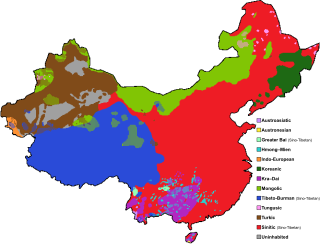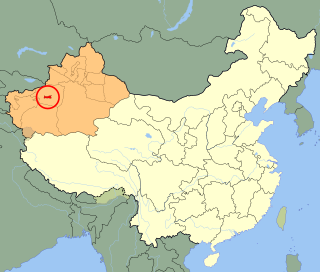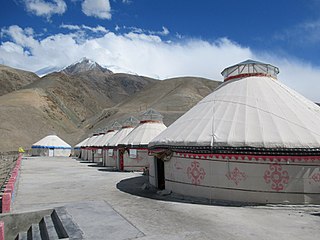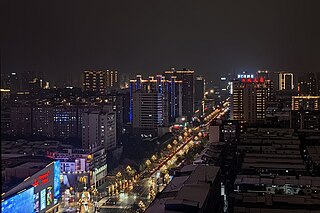
There are several hundred languages in China. The predominant language is Standard Chinese, which is based on Beijingese, but there are hundreds of related Chinese languages, collectively known as Hanyu, that are spoken by 92% of the population. The Chinese languages are typically divided into seven major language groups, and their study is a distinct academic discipline. They differ as much from each other morphologically and phonetically as do English, German and Danish, but meanwhile share the same writing system (Hanzi) and are mutually intelligible in written form. There are in addition approximately 300 minority languages spoken by the remaining 8% of the population of China. The ones with greatest state support are Mongolian, Tibetan, Uyghur and Zhuang.

Chinese autonomous administrative divisions are associated with one or more ethnic minorities that are designated as autonomous within the People's Republic of China. These areas are recognized in the Constitution of the People's Republic of China and are nominally given a number of rights not accorded to other administrative divisions of China. For example, Tibetan minorities in autonomous regions are granted rights and support not given to the Han Chinese, such as fiscal and medical subsidies.

The Central Radio & TV Tower is a 405-metre-tall (1,329 ft) telecommunications- and observation tower in Beijing, China. It was the tallest structure in the city until 2018, when it was surpassed by China Zun. It is the ninth-tallest tower in the world, and has its observation deck at 238 m (781 ft). The tower provides panoramic views over the city from its revolving restaurant and observation deck. It is a member of the World Federation of Great Towers.

Aral is a sub-prefecture-level city surrounded by Aksu Prefecture in Xinjiang Uyghur Autonomous Region, China. Aral means "island" in Uyghur. The city's name is often written as Alar.

Aksu Prefecture is located in mid-Western Xinjiang, China. It has an area of 131,161 km2 (50,642 sq mi) and 2.714 million inhabitants at the 2020 census whom 715,319 lived in the built-up area made up of Aksu urban district. The name Aksu is Turkic for 'white water'. Aksu Prefecture has a 263.8 km (163.9 mi) long international boundary with Kyrgyzstan and Kazakhstan.

Bortala Mongol Autonomous Prefecture is an autonomous prefecture in the northern Xinjiang, China. Its capital is Bole, also known as Bortala. It has a population of 475,483 inhabiting an area of 27,000 km2 (10,000 sq mi). Despite being designated an autonomous area for Mongols in China, only a little over five and a half per cent of Bortala's population is Mongol.

Kizilsu Kyrgyz Autonomous Prefecture is an autonomous prefecture in western Xinjiang, China, bordering Kyrgyzstan and Tajikistan. Its capital is Artux. The prefecture is home to 622,222 people and covers an area of 70,916 km2 (27,381 sq mi). Most Kyrgyz in China reside in Kizilsu; they make up a little over a quarter of the prefecture's population. The Uyghurs are the largest ethnic group in Kizilsu, consisting of nearly two-thirds of the population.

Tumxuk is a county-level city in the western part of Xinjiang, China. The eastern part of Tumxuk is surrounded by Maralbexi County, Kashgar Prefecture. The smaller western part is near Kashgar.

Bayingolin Mongol Autonomous Prefecture is an autonomous prefecture in the southeastern Xinjiang, China. It borders Gansu to the east, Qinghai to the southeast and the Tibet Autonomous Region to the south. It is the largest prefecture-level division nationally, with an area of 471,480 km2 (182,040 sq mi), which is even larger than its neighboring province of Gansu. The prefectural capital is Korla. Despite being designated an autonomous area for Mongols in China, only about four percent of Bayingolin's population is Mongol.

Changde is a prefecture-level city in the northwest of Hunan province, People's Republic of China. In addition to the urban districts, Changde also administers the county-level city of Jinshi and six counties. Changde is adjacent to Dongting Lake to the east, the city of Yiyang to the south, Wuling and Xuefeng Mountains to the west, and Hubei province to the north.
Ürümqi People's Broadcasting Station was a radio station broadcasting to Ürümqi and the Xinjiang province area. It was operated by the Xinjiang Networking Transmission Limited in Mandarin and Uyghur. It existed from 1979 until 2019 when it merged with Ürümqi Television forming Ürümqi Radio and TV Station.
Shanghai Television is a TV station based in Shanghai, China. It was founded in 1958. Its old web site address was www.stv.sh.cn. In 2001, it was merged with Radio Shanghai, Eastern Radio Shanghai, Oriental Television Station and Shanghai Cable Television under the name of Shanghai Media Group. It broadcasts 258 hours of TV and 214 hours of radio on a daily basis (2005).
Racism in China arises from Chinese history, nationalism, sinicization, and other factors. Racism in the People's Republic of China has been documented in numerous situations. Ethnic tensions have led to numerous incidents in the country such as the Xinjiang conflict, the ongoing internment and state persecution of Uyghurs and other ethnic minorities, the 2010 Tibetan language protest, the 2020 Inner Mongolia protests, discrimination against Africans in particular and discrimination against Black people in general.

The Guangzhou Broadcasting Network, also known as GZBN, is a municipally-owned television network in Guangzhou, Guangdong, People's Republic of China. The television department made its first broadcast on 10 January 1988, while radio department made its first broadcast on 1 December 1991. The GZBN is also owns a cable company and a showbiz newspaper, and owns Sky Link TV in the US.

Xinjiang Production and Construction Corps Radio and Television is a provincial satellite television station in Xinjiang, China, administered by the Xinjiang Production and Construction Corps (Bingtuan). It runs a television channel called Bingtuan Satellite Television (兵团卫视), which started its 24-hour satellite broadcasting through Sinosat-3 on 7 October 2007.
Xinjiang People's Broadcasting Station (XJBS) was a radio station broadcasting to the Xinjiang province area. It was operated by the Xinjiang Networking Transmission Limited in Mandarin, Uyghur, Kazakh, Kyrgyz and Mongolian languages. Founded as Dihua People's Broadcasting Station in 1949 it was renamed after Xinjiang in 1951. In 2018 it merged with Xinjiang Television (XJTV) forming the Xinjiang Radio and TV Station.
China Tibet Broadcasting is a broadcast network headquartered in Lhasa, Tibet Autonomous Region of the People's Republic of China. Its radio programmes were founded in 1959. Its English language audio broadcast is called Holy Tibet, broadcasts at 07:00 and 16:00 UTC every day.
The COVID-19 epidemic in Xinjiang Uyghur Autonomous Region is part of the worldwide pandemic of coronavirus disease 2019 (COVID-19) caused by severe acute respiratory syndrome coronavirus 2 (SARS-CoV-2). On 23 January 2020, the local government confirmed the first two case in Urumchi, the capital city of Xinjiang.

Yanbian Television or Yanbian TV is China’s only Korean-language satellite TV media. It was officially launched on August 10, 2006.














